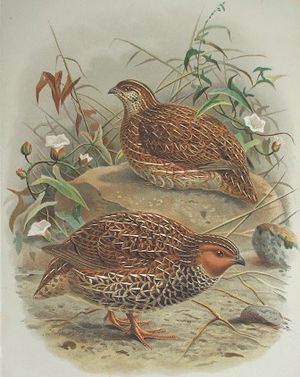New Zealand quail facts for kids
Quick facts for kids New Zealand quail |
|
|---|---|
 |
|
| Conservation status | |
| Scientific classification |
|
| Kingdom: | Animalia |
| Phylum: | Chordata |
| Class: | Aves |
| Order: | Galliformes |
| Family: | Phasianidae |
| Genus: | Coturnix |
| Species: |
†C. novaezelandiae
|
| Binomial name | |
| †Coturnix novaezelandiae Quoy & Gaimard, 1830
|
|
| Script error: The function "autoWithCaption" does not exist. | |
| Synonyms | |
|
Coturnix novaezelandiae |
|
Script error: No such module "Check for conflicting parameters".
The New Zealand quail (Coturnix novaezelandiae) was a small bird that used to live only in New Zealand. Its Māori name was koreke. Sadly, this type of quail is now extinct, meaning there are none left alive.
Male and female quails looked quite alike. The female birds were just a bit lighter in color. The first scientist to write about this quail was Sir Joseph Banks. He saw it when he visited New Zealand with James Cook a long time ago.
These quails lived on the ground in grassy areas called tussock grasslands. They also liked open fernlands in the lowlands. The first time a European collected one of these quails was in 1827. This happened during a trip by Dumont D'Urville, and the collectors were Jean René Constant Quoy and Joseph Paul Gaimard.
Searching for the Koreke
For many years, people wondered if the New Zealand quail might still be alive. Between 2007 and 2009, scientists looked for them on Tiritiri Matangi Island. This island was a good place to look because it had not been badly affected by animals brought in by humans. These new animals often hunt native birds.
Scientists thought the quails on the island might be true New Zealand quails. They also thought they could be a mix, or hybrid, of the koreke and the brown quail from Australia.
What Genetic Tests Showed
To find out for sure, scientists did a genetic study. They looked at the DNA of the quails on Tiritiri Matangi Island. The results showed that these quails were actually Australian brown quails (Coturnix ypsilophora).
The study also looked at the DNA of all quail species in the Coturnix family from Australia and New Zealand. This helped them understand how these quails are related.
Naming and Family Tree
Sometimes, scientists thought the New Zealand quail was the same species as the stubble quail from Australia. The stubble quail is called Coturnix pectoralis. If they were the same, the New Zealand quail's name would have been used first. It would have been called Coturnix novaezelandiae pectoralis.
However, the genetic tests showed something different. They proved that the New Zealand quail and the Australian stubble quail are separate species. Even though they are different, they are still very closely related.
Gallery
-
Illustration of the Chatham rail and the New Zealand quail from 1907
See also
 In Spanish: Codorniz de Nueva Zelanda para niños
In Spanish: Codorniz de Nueva Zelanda para niños
 | Emma Amos |
 | Edward Mitchell Bannister |
 | Larry D. Alexander |
 | Ernie Barnes |




